Comparative Analysis of IFRS Adoption and its Implications
VerifiedAdded on 2022/11/17
|5
|1081
|215
Report
AI Summary
This report delves into the global adoption of International Financial Reporting Standards (IFRS), examining its influence on financial statement reliability and comparability. The analysis begins with an overview of the IFRS framework and its role in enhancing financial disclosures. The report then investigates the impact of IFRS adoption since 2005 in regions like Australia and the European Union, evaluating whether the quality of corporate reporting has improved. Furthermore, it explores the reasons behind the Financial Accounting Standards Board (FASB) in the US not adopting IFRS, including the high costs, perceived deficiencies, and differences in accounting principles. The report concludes by summarizing the key findings and implications of IFRS adoption, highlighting its impact on financial statement comparability, and offering insights into the ongoing debate surrounding its implementation.
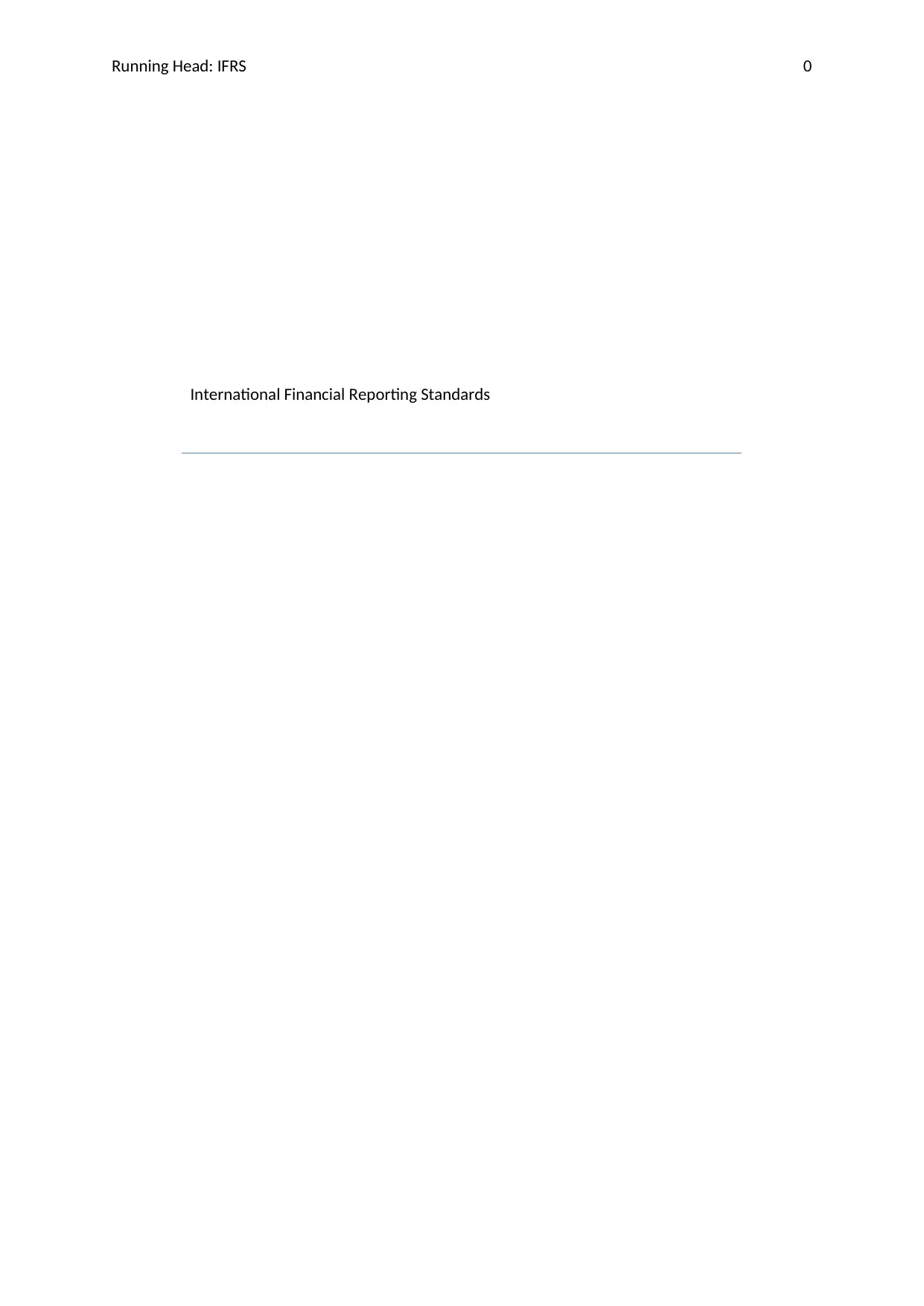
Running Head: IFRS 0
International Financial Reporting Standards
International Financial Reporting Standards
Paraphrase This Document
Need a fresh take? Get an instant paraphrase of this document with our AI Paraphraser
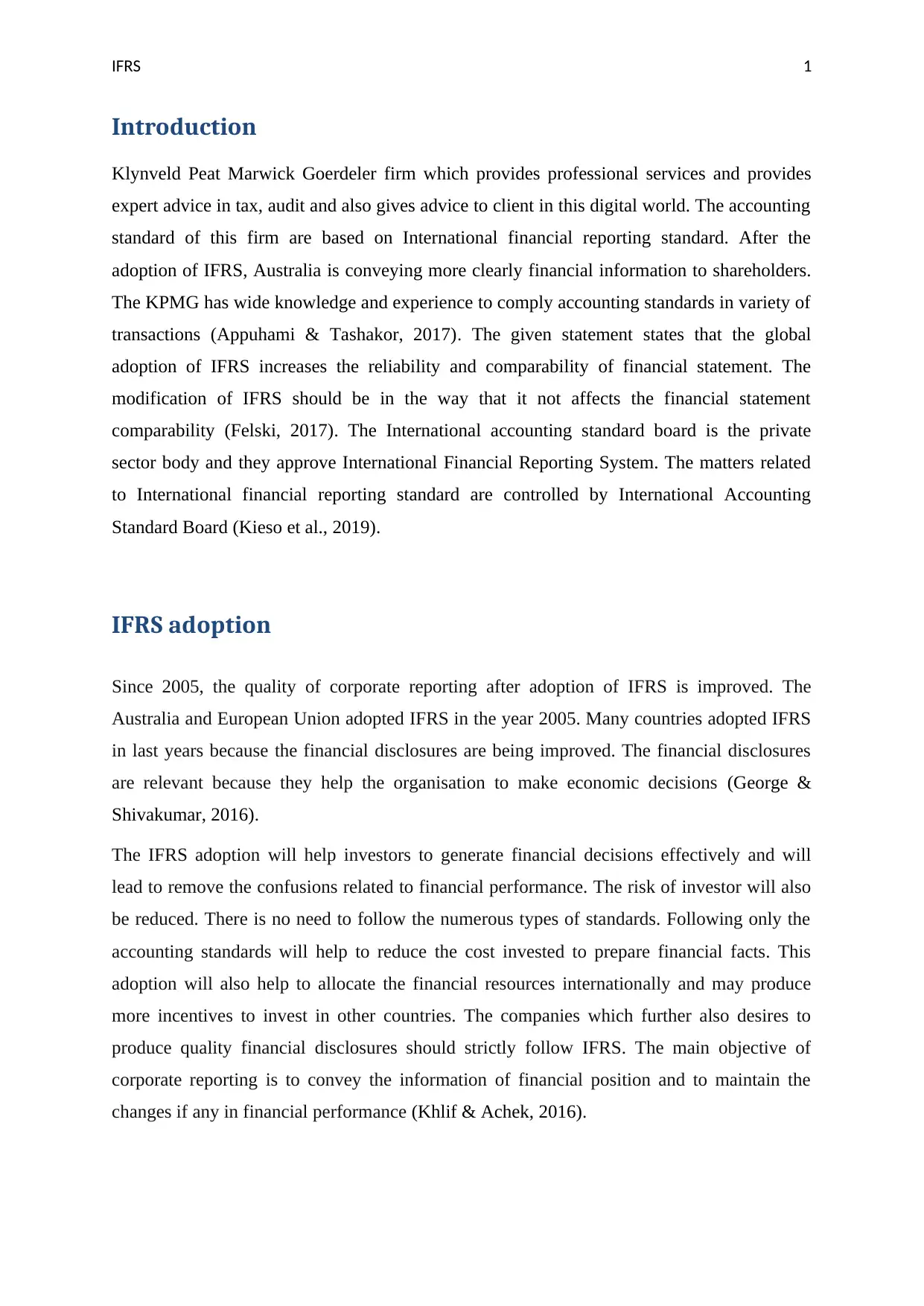
IFRS 1
Introduction
Klynveld Peat Marwick Goerdeler firm which provides professional services and provides
expert advice in tax, audit and also gives advice to client in this digital world. The accounting
standard of this firm are based on International financial reporting standard. After the
adoption of IFRS, Australia is conveying more clearly financial information to shareholders.
The KPMG has wide knowledge and experience to comply accounting standards in variety of
transactions (Appuhami & Tashakor, 2017). The given statement states that the global
adoption of IFRS increases the reliability and comparability of financial statement. The
modification of IFRS should be in the way that it not affects the financial statement
comparability (Felski, 2017). The International accounting standard board is the private
sector body and they approve International Financial Reporting System. The matters related
to International financial reporting standard are controlled by International Accounting
Standard Board (Kieso et al., 2019).
IFRS adoption
Since 2005, the quality of corporate reporting after adoption of IFRS is improved. The
Australia and European Union adopted IFRS in the year 2005. Many countries adopted IFRS
in last years because the financial disclosures are being improved. The financial disclosures
are relevant because they help the organisation to make economic decisions (George &
Shivakumar, 2016).
The IFRS adoption will help investors to generate financial decisions effectively and will
lead to remove the confusions related to financial performance. The risk of investor will also
be reduced. There is no need to follow the numerous types of standards. Following only the
accounting standards will help to reduce the cost invested to prepare financial facts. This
adoption will also help to allocate the financial resources internationally and may produce
more incentives to invest in other countries. The companies which further also desires to
produce quality financial disclosures should strictly follow IFRS. The main objective of
corporate reporting is to convey the information of financial position and to maintain the
changes if any in financial performance (Khlif & Achek, 2016).
Introduction
Klynveld Peat Marwick Goerdeler firm which provides professional services and provides
expert advice in tax, audit and also gives advice to client in this digital world. The accounting
standard of this firm are based on International financial reporting standard. After the
adoption of IFRS, Australia is conveying more clearly financial information to shareholders.
The KPMG has wide knowledge and experience to comply accounting standards in variety of
transactions (Appuhami & Tashakor, 2017). The given statement states that the global
adoption of IFRS increases the reliability and comparability of financial statement. The
modification of IFRS should be in the way that it not affects the financial statement
comparability (Felski, 2017). The International accounting standard board is the private
sector body and they approve International Financial Reporting System. The matters related
to International financial reporting standard are controlled by International Accounting
Standard Board (Kieso et al., 2019).
IFRS adoption
Since 2005, the quality of corporate reporting after adoption of IFRS is improved. The
Australia and European Union adopted IFRS in the year 2005. Many countries adopted IFRS
in last years because the financial disclosures are being improved. The financial disclosures
are relevant because they help the organisation to make economic decisions (George &
Shivakumar, 2016).
The IFRS adoption will help investors to generate financial decisions effectively and will
lead to remove the confusions related to financial performance. The risk of investor will also
be reduced. There is no need to follow the numerous types of standards. Following only the
accounting standards will help to reduce the cost invested to prepare financial facts. This
adoption will also help to allocate the financial resources internationally and may produce
more incentives to invest in other countries. The companies which further also desires to
produce quality financial disclosures should strictly follow IFRS. The main objective of
corporate reporting is to convey the information of financial position and to maintain the
changes if any in financial performance (Khlif & Achek, 2016).
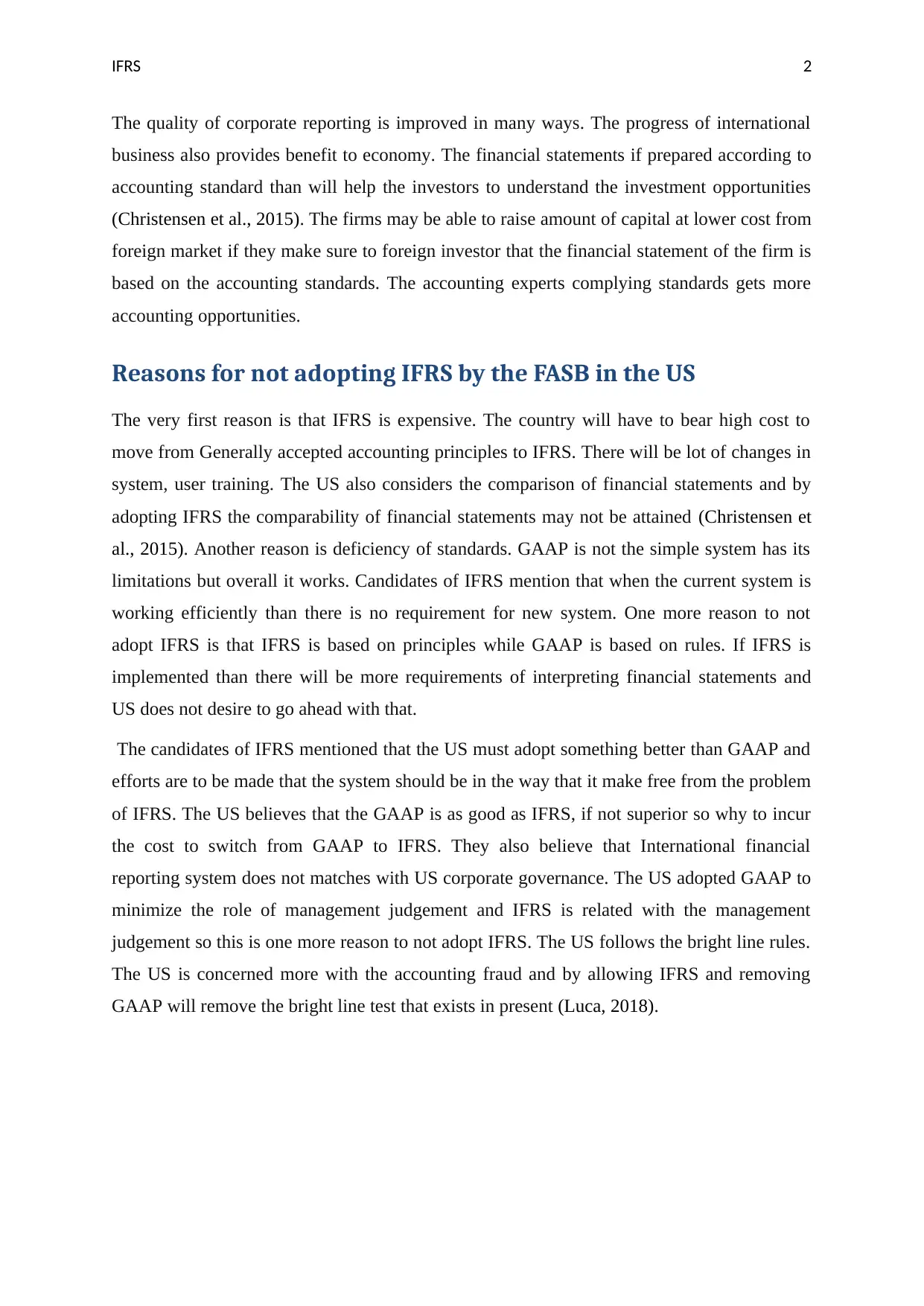
IFRS 2
The quality of corporate reporting is improved in many ways. The progress of international
business also provides benefit to economy. The financial statements if prepared according to
accounting standard than will help the investors to understand the investment opportunities
(Christensen et al., 2015). The firms may be able to raise amount of capital at lower cost from
foreign market if they make sure to foreign investor that the financial statement of the firm is
based on the accounting standards. The accounting experts complying standards gets more
accounting opportunities.
Reasons for not adopting IFRS by the FASB in the US
The very first reason is that IFRS is expensive. The country will have to bear high cost to
move from Generally accepted accounting principles to IFRS. There will be lot of changes in
system, user training. The US also considers the comparison of financial statements and by
adopting IFRS the comparability of financial statements may not be attained (Christensen et
al., 2015). Another reason is deficiency of standards. GAAP is not the simple system has its
limitations but overall it works. Candidates of IFRS mention that when the current system is
working efficiently than there is no requirement for new system. One more reason to not
adopt IFRS is that IFRS is based on principles while GAAP is based on rules. If IFRS is
implemented than there will be more requirements of interpreting financial statements and
US does not desire to go ahead with that.
The candidates of IFRS mentioned that the US must adopt something better than GAAP and
efforts are to be made that the system should be in the way that it make free from the problem
of IFRS. The US believes that the GAAP is as good as IFRS, if not superior so why to incur
the cost to switch from GAAP to IFRS. They also believe that International financial
reporting system does not matches with US corporate governance. The US adopted GAAP to
minimize the role of management judgement and IFRS is related with the management
judgement so this is one more reason to not adopt IFRS. The US follows the bright line rules.
The US is concerned more with the accounting fraud and by allowing IFRS and removing
GAAP will remove the bright line test that exists in present (Luca, 2018).
The quality of corporate reporting is improved in many ways. The progress of international
business also provides benefit to economy. The financial statements if prepared according to
accounting standard than will help the investors to understand the investment opportunities
(Christensen et al., 2015). The firms may be able to raise amount of capital at lower cost from
foreign market if they make sure to foreign investor that the financial statement of the firm is
based on the accounting standards. The accounting experts complying standards gets more
accounting opportunities.
Reasons for not adopting IFRS by the FASB in the US
The very first reason is that IFRS is expensive. The country will have to bear high cost to
move from Generally accepted accounting principles to IFRS. There will be lot of changes in
system, user training. The US also considers the comparison of financial statements and by
adopting IFRS the comparability of financial statements may not be attained (Christensen et
al., 2015). Another reason is deficiency of standards. GAAP is not the simple system has its
limitations but overall it works. Candidates of IFRS mention that when the current system is
working efficiently than there is no requirement for new system. One more reason to not
adopt IFRS is that IFRS is based on principles while GAAP is based on rules. If IFRS is
implemented than there will be more requirements of interpreting financial statements and
US does not desire to go ahead with that.
The candidates of IFRS mentioned that the US must adopt something better than GAAP and
efforts are to be made that the system should be in the way that it make free from the problem
of IFRS. The US believes that the GAAP is as good as IFRS, if not superior so why to incur
the cost to switch from GAAP to IFRS. They also believe that International financial
reporting system does not matches with US corporate governance. The US adopted GAAP to
minimize the role of management judgement and IFRS is related with the management
judgement so this is one more reason to not adopt IFRS. The US follows the bright line rules.
The US is concerned more with the accounting fraud and by allowing IFRS and removing
GAAP will remove the bright line test that exists in present (Luca, 2018).
⊘ This is a preview!⊘
Do you want full access?
Subscribe today to unlock all pages.

Trusted by 1+ million students worldwide
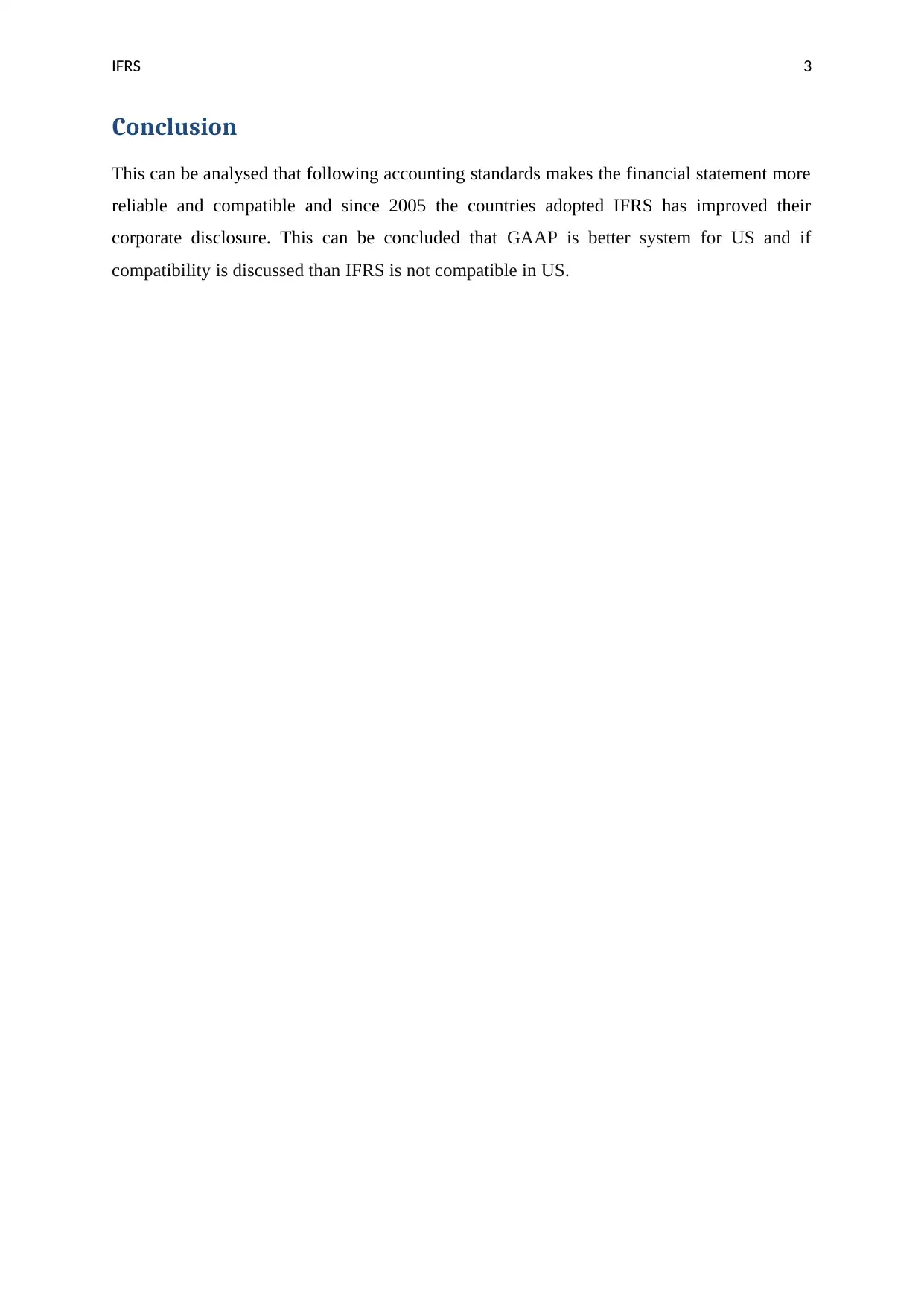
IFRS 3
Conclusion
This can be analysed that following accounting standards makes the financial statement more
reliable and compatible and since 2005 the countries adopted IFRS has improved their
corporate disclosure. This can be concluded that GAAP is better system for US and if
compatibility is discussed than IFRS is not compatible in US.
Conclusion
This can be analysed that following accounting standards makes the financial statement more
reliable and compatible and since 2005 the countries adopted IFRS has improved their
corporate disclosure. This can be concluded that GAAP is better system for US and if
compatibility is discussed than IFRS is not compatible in US.
Paraphrase This Document
Need a fresh take? Get an instant paraphrase of this document with our AI Paraphraser
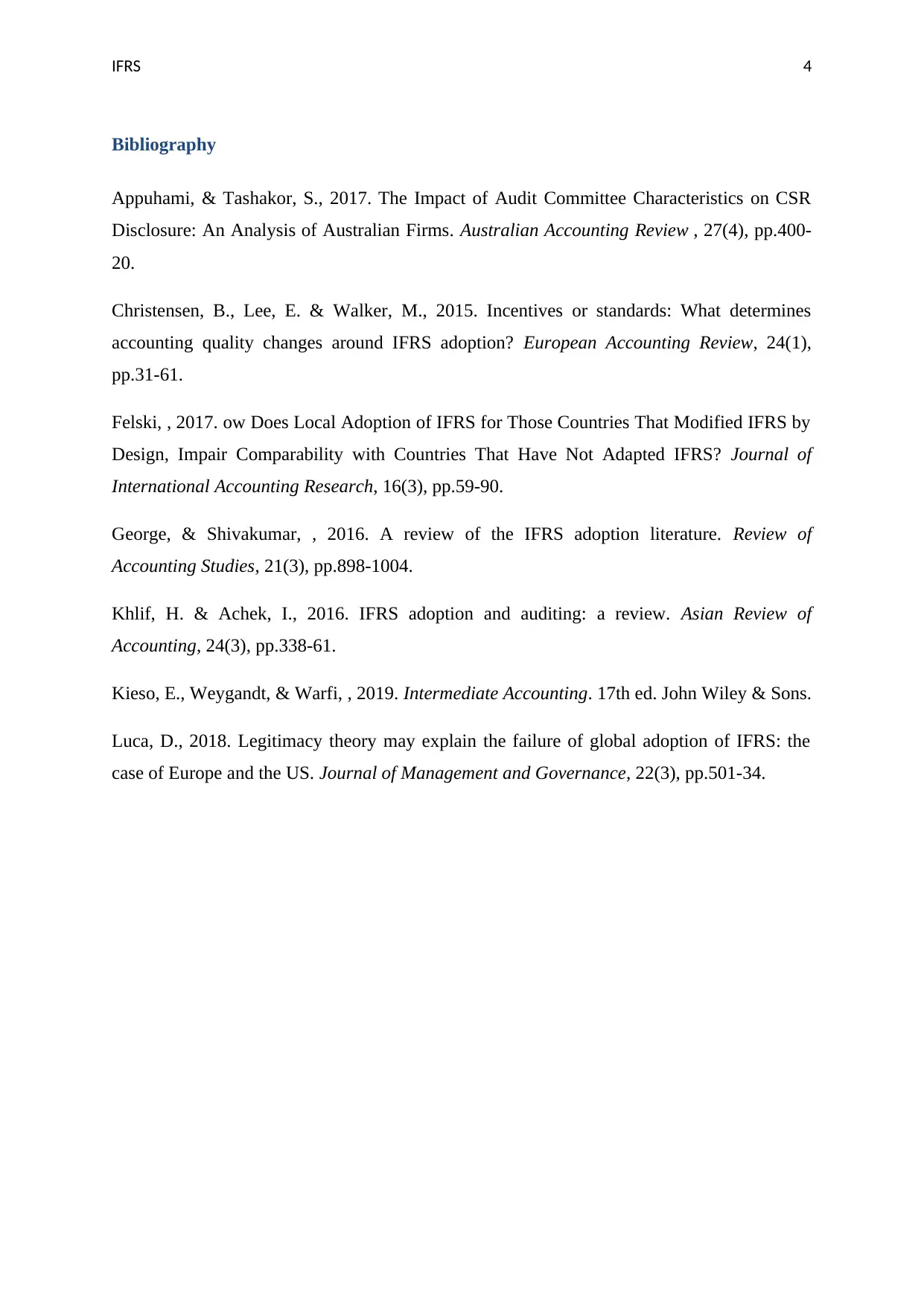
IFRS 4
Bibliography
Appuhami, & Tashakor, S., 2017. The Impact of Audit Committee Characteristics on CSR
Disclosure: An Analysis of Australian Firms. Australian Accounting Review , 27(4), pp.400-
20.
Christensen, B., Lee, E. & Walker, M., 2015. Incentives or standards: What determines
accounting quality changes around IFRS adoption? European Accounting Review, 24(1),
pp.31-61.
Felski, , 2017. ow Does Local Adoption of IFRS for Those Countries That Modified IFRS by
Design, Impair Comparability with Countries That Have Not Adapted IFRS? Journal of
International Accounting Research, 16(3), pp.59-90.
George, & Shivakumar, , 2016. A review of the IFRS adoption literature. Review of
Accounting Studies, 21(3), pp.898-1004.
Khlif, H. & Achek, I., 2016. IFRS adoption and auditing: a review. Asian Review of
Accounting, 24(3), pp.338-61.
Kieso, E., Weygandt, & Warfi, , 2019. Intermediate Accounting. 17th ed. John Wiley & Sons.
Luca, D., 2018. Legitimacy theory may explain the failure of global adoption of IFRS: the
case of Europe and the US. Journal of Management and Governance, 22(3), pp.501-34.
Bibliography
Appuhami, & Tashakor, S., 2017. The Impact of Audit Committee Characteristics on CSR
Disclosure: An Analysis of Australian Firms. Australian Accounting Review , 27(4), pp.400-
20.
Christensen, B., Lee, E. & Walker, M., 2015. Incentives or standards: What determines
accounting quality changes around IFRS adoption? European Accounting Review, 24(1),
pp.31-61.
Felski, , 2017. ow Does Local Adoption of IFRS for Those Countries That Modified IFRS by
Design, Impair Comparability with Countries That Have Not Adapted IFRS? Journal of
International Accounting Research, 16(3), pp.59-90.
George, & Shivakumar, , 2016. A review of the IFRS adoption literature. Review of
Accounting Studies, 21(3), pp.898-1004.
Khlif, H. & Achek, I., 2016. IFRS adoption and auditing: a review. Asian Review of
Accounting, 24(3), pp.338-61.
Kieso, E., Weygandt, & Warfi, , 2019. Intermediate Accounting. 17th ed. John Wiley & Sons.
Luca, D., 2018. Legitimacy theory may explain the failure of global adoption of IFRS: the
case of Europe and the US. Journal of Management and Governance, 22(3), pp.501-34.
1 out of 5
Related Documents
Your All-in-One AI-Powered Toolkit for Academic Success.
+13062052269
info@desklib.com
Available 24*7 on WhatsApp / Email
![[object Object]](/_next/static/media/star-bottom.7253800d.svg)
Unlock your academic potential
Copyright © 2020–2026 A2Z Services. All Rights Reserved. Developed and managed by ZUCOL.





